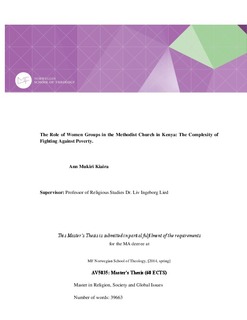| dc.description.abstract | This study seeks to explore the role women groups in the Methodist church in Kenya are playing to fight poverty. To realize the aimed goal of exploring what role women are playing in the Methodist church to fight against poverty, the questions guiding the study were (a) what are women’s experiences as far as poverty is concerned and how do they conceptualize it? (b)What activities are carried out by the women groups and ways are the women in the Methodist churches under study doing to fight poverty? (c)To what extent does the Methodist church the umbrella of the women group organizations; support the women in their fight against poverty?
The study used qualitative inquiry employing a multiple case study approach. The tools used for collecting data were semi-structured interviews, observations and a field notebook. Key findings from the study indicate that: The women had suffered the effects of poverty such as inability to meet basic needs: food, decent shelter, clothes, inability to cater for maternity cost, illiteracy and lacked income; Landlessness; Single parenthood; violence against women and could not access funding from regular lending agencies.
The women in the Methodist churches in the study have formed self-help groups and are carrying out projects to generate income. They are planting trees to control environmental degradation. They are learning family planning and prevention of Sexually Transmitted Infections (STIs) and HIV/AIDS. They are also being educated on; human rights, curbing child labor and school-drop outs, female genital mutilation (FGM), better methods of agriculture, such as poultry rearing, production of bio-gas, making of improved Jikos (Jikos is a Kiswahili name for stoves), learning general hygiene, cookery, weaving, basketry and knitting. They sing inspiring and educative songs, dance for entertainment and dramatize bible verses as a way of expressing their ideas, feelings and opinions. All these are done in the name of fighting against poverty.
This makes the style of fighting poverty employed by the women groups look complex. The focus of the thesis is the complexity of their experiences and conceptions of poverty on one hand and the activities they take part in to fight poverty on the other. Hence
the title of the study is: The role of women groups in the Methodist Church in Kenya: The Complexity of Fighting Against poverty.
The church is supporting women under study to fight against poverty by offering pastoral care. It offers moral support to the women as they carry out the projects. The other members in the Methodist church in study help the women to contribute when they hold Harambee. A Kiswahili word used to mean joining hands to make any challenging task easy. | nb_NO |
